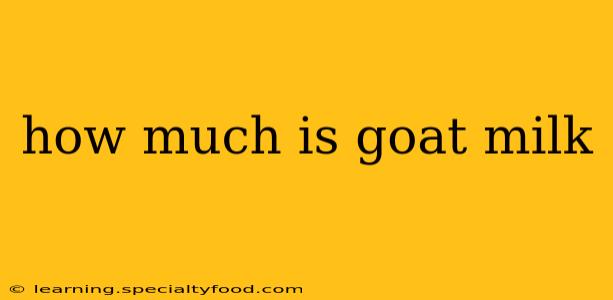How Much is Goat Milk? A Comprehensive Guide to Pricing and Factors Affecting Cost
The price of goat milk varies significantly depending on several factors. There's no single answer to "How much is goat milk?" because the cost fluctuates based on location, purchase method, and the milk's processing. Let's break down the key influences on goat milk pricing.
Where Can I Buy Goat Milk and How Much Does It Cost?
You can typically find goat milk at several locations, each with its own pricing structure:
-
Local Farms/Dairies: This is often the most affordable option, especially if you buy in bulk. Prices can range from $6 to $12 per gallon, sometimes even less depending on the farm's pricing and volume discounts. Directly sourcing from the farm often means getting fresh, unpasteurized milk, but it's important to check local regulations regarding raw milk consumption.
-
Farmers' Markets: Similar to buying directly from farms, farmers' markets usually offer competitively priced goat milk, though slightly higher than buying directly from the source due to market fees. Expect to pay around $8 to $15 per gallon.
-
Grocery Stores: Grocery stores carry both pasteurized goat milk and various goat milk products. The price here tends to be higher due to processing, packaging, and retail markups. You can anticipate paying anywhere from $4 to $8 per quart, or even more for specialty brands or organic options.
-
Online Retailers: Purchasing goat milk online might be convenient but comes with added shipping costs and potentially higher prices due to handling and transportation fees. Prices vary greatly depending on the retailer and brand.
What Factors Influence Goat Milk Prices?
Several factors contribute to the final price you pay for goat milk:
-
Type of Goat Milk: Raw (unpasteurized) goat milk is generally cheaper than pasteurized milk due to fewer processing steps. Organic goat milk will typically command a higher price due to higher production costs.
-
Processing and Packaging: Pasteurization, homogenization, and packaging all add to the cost of goat milk. Specialty packaging, like glass bottles, can also increase the price.
-
Brand and Demand: Popular brands or those marketed as high-quality often have higher prices due to branding and perceived value. Regional demand also plays a role. Areas with limited goat milk production might experience higher prices due to supply and demand dynamics.
-
Location: Geographic location greatly impacts pricing. Goat milk production costs vary by region, influencing prices in different parts of the country or the world. Rural areas might have lower prices due to proximity to farms.
-
Seasonality: Goat milk production can fluctuate seasonally, sometimes leading to price changes.
What About Goat Milk Alternatives and Products?
Besides liquid goat milk, many other products are available, including:
- Goat Cheese: This is often more expensive than the milk itself due to the additional processing and aging involved.
- Goat Yogurt: Prices are generally comparable to cow's milk yogurt.
- Goat Milk Soap: This product is not directly related to the price of the milk but is commonly made with goat's milk.
How Can I Find the Best Deal on Goat Milk?
- Shop Around: Compare prices at different locations, including local farms, farmers' markets, and grocery stores.
- Buy in Bulk: When purchasing from local farms, buying larger quantities can often result in a lower per-unit cost.
- Consider Alternatives: If cost is a primary concern, consider alternatives like goat milk powder, which can be more affordable in the long run.
- Look for Sales and Discounts: Keep an eye out for seasonal sales or special offers on goat milk at your local stores.
Ultimately, the cost of goat milk depends on several interacting factors. By understanding these factors, you can make informed decisions about where and how to purchase goat milk to best suit your budget and preferences.
